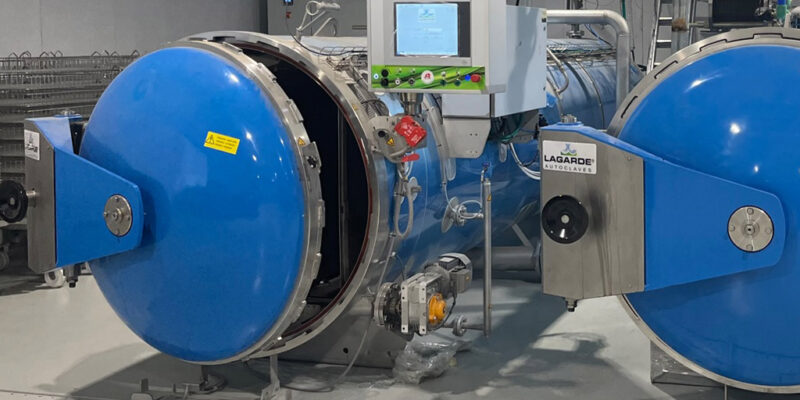STERILIZATION LINE AND COOLING SYSTEM FOR SAUCES AND SOUPS
Soups and sauces, depending on their pH and distribution channel, are either pasteurized or sterilized. These are generally low-acid products, meaning they require sterilization or an additional barrier against spoilage, such as cooling. After in-depth consultation with the customer, it was decided that all products would be shelf-stable, with the customer desiring multiple types of packaging. As this customer primarily produces private label products, the packaging options would include pouches, glass jars, and cans. In this scenario, cans would comprise a smaller fraction of the production, with pouches, especially doy-packs, representing the larger portion for both soups and sauces.
The project involved not only the introduction of new machines but also the relocation of some existing machines, presenting the challenge of necessary upgrades. This was handled separately before moving to the new site, ensuring both existing and incoming machines could be integrated into the same installation seamlessly.
Another challenge in this project was designing a new cooling system for all autoclaves, capable of cooling multiple batches simultaneously and aiming to recover as much water as possible. A system was designed to collect drain water into a central tank for reuse in other applications, such as cleaning.
The cooling system features a central tank and a circular pressure tube, which either returns water to the tank or supplies cooling water to the autoclave in need. This simple yet efficient system includes a split cooling tank: hot water enters the hot side, travels through a cooler to the cold side, and the cold side has an overflow back to the hot side, thus cooling the system internally.
After positioning the autoclaves, some were equipped with a lifting table to accommodate the various loading heights required for the customer’s different accessories. Thermal Process Systems devised a creative and flexible solution for this. The tubing was installed by a local team according to our drawings and under the supervision of our engineering team. Following comprehensive testing, commissioning with the product began.
During the initial phase, various products were tested for their new recipes and required F-values, including light soups in glass jars, cheese sauces in doy packs, and pasta sauces for the restaurant industry. The system was put to the test but performed well, allowing the customer to continue with their standard production program. In a remarkably short timeline, the customer was able to relocate their production, increase productivity, and reduce their energy and water consumption.
Notably, the reduced water and energy usage also helped to meet local environmental standards, and the space created by the project allows for future production expansion.

